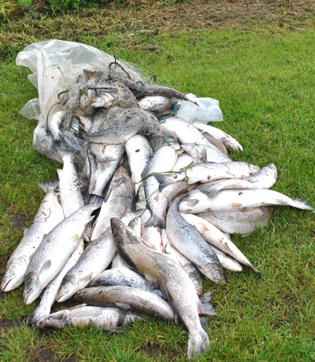 A major and indiscriminate fish kill on an East Lothian river last week has prompted condemnation from the police and local and national fisheries organisations. 60 very large sea trout – ranging between 4 lb and 12 lb – were found dead in a poacher’s net on the River Tyne, near East Linton. The net was retrieved by a team of water bailiffs who act for the Forth District Salmon Fishery Board (FDSFB) in partnership with the local Police Wildlife Crime Officer.
A major and indiscriminate fish kill on an East Lothian river last week has prompted condemnation from the police and local and national fisheries organisations. 60 very large sea trout – ranging between 4 lb and 12 lb – were found dead in a poacher’s net on the River Tyne, near East Linton. The net was retrieved by a team of water bailiffs who act for the Forth District Salmon Fishery Board (FDSFB) in partnership with the local Police Wildlife Crime Officer.
Illegal netting of salmon and sea trout is criminal activity and is regarded as a serious wildlife crime. The nets used are largely invisible, and capture fish by the gills; the fish suffer a slow death. Furthermore, these nets, due to the way they are set and concealed, present a serious danger to other aquatic life, such as otters, birds and other wildlife. This incident is a major setback to the excellent conservation work undertaken by local groups and volunteers, such as the East Lothian Angling Association (ELAA). ELAA has spent considerable time and effort improving the river habitat and promoting good angling practice such as catch and release to help conserve stocks.
Fen Howieson, Chairman of the FDSFB, condemned this latest incident: “Our Board and team of bailiffs invest considerable time and effort in dealing with such incidents. Netting like this is an illegal, selfish and indiscriminate act which endangers fish and other wildlife and unravels much good work undertaken by the ELAA and other local groups, not forgetting the long term impact on fragile fish populations within the Tyne”.
Brian Davidson, Operations Director of the ASFB, added: “This is a stark reminder that illegal and indiscriminate netting of our valuable migratory fish is still a major problem in some areas. Our national professional bailiff network is well placed to deal with such incidents. However, despite the best efforts of our bailiffs and police, it is not always possible to anticipate where such incidents will occur and apprehend those involved. We applaud the efforts of the local Police Wildlife Crime Officer, FDSFB Bailiffs and local angling association in their continued work to reduce such illegal and environmentally damaging acts. Unfortunately, in the absence of a numbered carcass tagging scheme in Scotland, such fish have a much easier route to market than would otherwise be the case, and we welcome the Government current proposals to consult on a carcass tagging as a means of reducing illegal activity, and very much hope that a new scheme will be introduced by 2015”.
Police Constable Gavin Ross, Wildlife Crime Officer, said: “This incident should underline to the public that poaching is not about ‘one for the pot’, but rather it is mainly an activity for financial gain committed by criminals who are causing long term environmental damage. I appeal to members of the public who see suspicious activity such as nets in rivers to contact the police on 101. I would also advise people not to buy salmon or sea trout that may have been illegally procured as this only encourages such criminal activity. Furthermore the purchase of such fish may itself be an offence”.
Scott McIntosh, President of ELAA, commented: “The Tyne is a productive and well-managed small river, offering excellent and widely accessible fishing to the public at very reasonable cost. Such selfish and illegal behaviour seriously compromises the health of the river and other wildlife, and undermines much good conservation work that is undertaken locally. The river is a valuable natural resource for our community and the perpetrators of this selfish and illegal act have seriously affected the enjoyment of this for many people”.
Anyone with information that could assist police enquiries should contact 101, or speak to any officer. Information can also be provided anonymously via the charity Crimestoppers on 0800 555 111. The Forth DSFB Head bailiff may also be contacted on 07887 835549
The Partnership for Action Against Wildlife Crime in Scotland (PAW Scotland) offers a free iPhone app which can be used to record details of a suspected wildlife crime and email them to the police. This can be downloaded via www.PAW.Scotland.gov.uk. PAW Scotland is the Partnership for Action against Wildlife Crime in Scotland. PAW Scotland membership encompasses a wide range of bodies with an interest in tackling wildlife crime including conservation, land management, shooting and law enforcement organisations.
